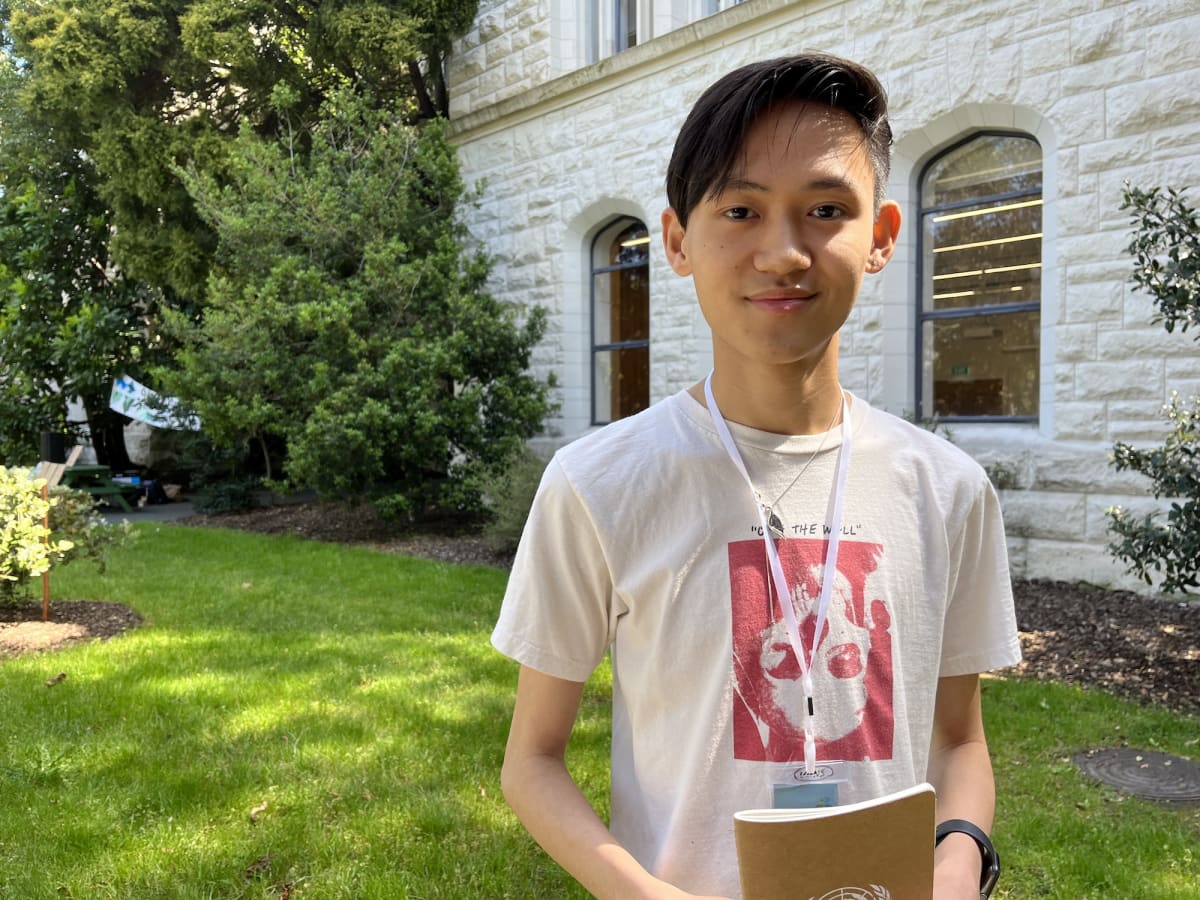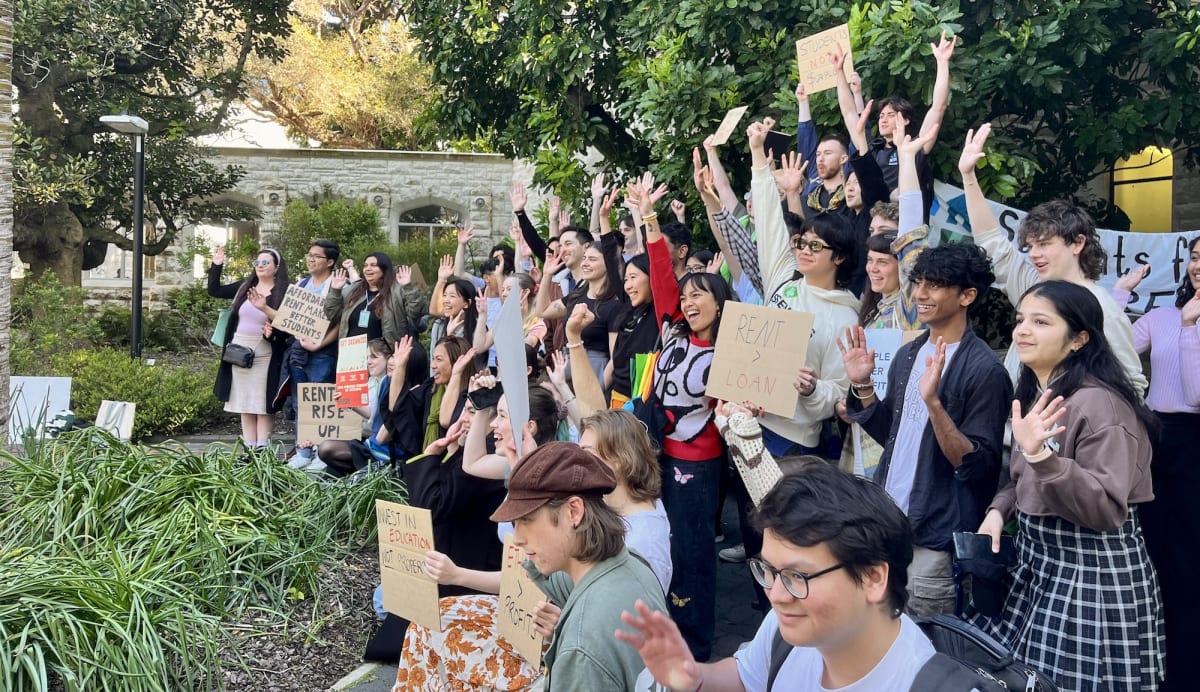
Candidates in the contest for Auckland Central are vying for the student vote to take them over the line
A rally for lower rent in student accommodations became another stop on the campaign trail for Auckland Central candidates on Friday afternoon.
Student activists under the banner of Students for Fair Rent are lobbying the University of Auckland to reduce ever-increasing rents at its halls of residence.
READ MORE:
* National and Labour eye up Auckland Central
* A tale of two electorates
The group hosted several political hopefuls at an on-campus rally where they hoped to pass a petition of more than 1000 signatures along to vice-chancellor Dawn Freshwater.
The failure of university heads to attend only galvanised the small but passionate group of protesters, who are lambasting announced 8 percent rent increases to Waipārūrū Hall, where weekly rent is rising from $470 to $510 next year.
Group chair Matthew Lee has done the maths – even with a student allowance, a person would need to work 10 hours to cover rent. That goes up to 25 hours for international students, all on top of full-time study.
Lee said that’s “absolutely absurd” on top of full-time study and other cost-of-living pain points.
“That doesn’t include a box of tissues because you want to cry because rent is so much,” he said.

The University of Auckland is the country’s biggest supplier of student accommodation.
Lee said young people were being robbed of the student experience while the institution made a record $130 million in excess profit in 2021.
The group is calling on the university to use inflation rates and average rent prices in the area as limits for rent increases.
A spokesperson for the university meanwhile said Waipapa they were "well aware of the challenges the cost of living puts on many of our students".
"We work hard to minimise accommodation fees, and in fact have kept these low in comparison to other Aotearoa New Zealand universities," they said, adding that if costs are not covered at the halls of residence, they must be met by the university through funding that would otherwise be spent on teaching and research.
Lee said the group had worked with politicians from both sides of the aisle and wasn’t calling on the students to vote a certain way – just to sign the petition and get themselves to the voting booth.
The front-runners in the Auckland Central electorate contest have all had their own experiences at the University of Auckland and their own relationship with student housing issues.
Incumbent MP Chlöe Swarbrick instigated the People’s Inquiry into Student Wellbeing in 2021, which saw student associations across the country surveying students to get a snapshot of their woes.
Swarbrick said this came from seeing mistreatment of student accommodation residents during lockdown. Lee said the inquiry in turn was what led to Students for Fair Rent.
But he also said National’s Mahesh Muralidhar had been a “fierce supporter” since the beginning.
Then there’s Labour’s Oscar Sims, who has a background in fair housing advocacy and has been agitating from outside his party for better housing options for people in Auckland Central for years.
The rally provided a unique opportunity for the three of them – along with Dr Nina Su from The Opportunities Party – to show up and try to attract some of that student vote.

2020 saw a nearly 20 percent jump in the youth vote. Nevertheless it remains an age group with low enrolment, especially among students who move around a lot.
Forty-five percent of the country’s halls of residence are for first-years only, meaning there are also a high number of first-time voters in this group who may have just moved away from their home electorate.
Those are votes just sitting and waiting to be scooped up by somebody.
In many cases, that somebody will be Chlöe Swarbrick. She was on campus most of Friday, voting in front of the TV cameras before taking to the campus and convincing people to cast their own ballot.
A quiet Friday on campus didn’t stop her from being near-mobbed at points, as students came up to get pics with the high-profile MP.
She’s more than just a politician on the grounds of the university. Swarbrick regularly appears above her party’s co-leaders on the preferred prime minister polls and has gained a cult status transcending the usual politician.
Some of that’s through meme-ification: ‘Okay, boomer’, the green jumpers, the repeated K Road bonafides. But in a campaign where reaching Generation Z is tantamount, memes are invaluable.

Swarbrick said recent poll results that show her narrowly ahead of Muralidhar prove people shouldn’t get complacent, and get out and vote even if they think she’ll win.
It seems there’s a slight worry that some of the voting base from last time may not be as invigorated to turn up now that it’s not 2020 and she’s lost some of that plucky underdog status.
But at the same time, Swarbrick has been dismissive of such polls in the past with good reason. In 2020, some polls showed her in third place and were proven massively wrong on the night.
“We are the polls,” Swarbrick has said many times.
But Muralidhar is also feeling pretty confident, and with a massive swing in party polls towards National behind him, nobody can discount him just yet.
The former entrepreneur was also on campus today, convincing the student body that he has their back.
Muralidhar is another University of Auckland alum, having come through O’Rorke Hall and then staying on for some time as a resident adviser.
But when it comes to attracting the vote of socially conscious and politically engaged students, the Greens have a home advantage.
Muralidhar didn’t let that stop him in the rally, taking to the picnic table stage to promise management of inflation, bolstering of housing supply and control of government-backed agencies.
“Outside of this, productivity has to be improved so young Kiwis like you have a wonderful future in New Zealand,” he said. “With me you’d have a socially progressive National Party MP as part of a National Party-led government, somebody with 20 years of global experience fighting for you and making sure your voices are heard.”
He received a muted response compared to Swarbrick, who was joined at the event by party co-leaders James Shaw and Marama Davidson, who also took the stage to lend some of their own political gravity.
Swarbrick talked about launching the inquiry and promising to include student accommodation on the Residential Tenancies Act.
Exemption from the act means student accommodation isn’t covered by the same rent control laws as other rentals.
“You know that the Greens are on your side, and as far as I’m concerned, just look at the policies and you’ll see that we are the only ones that are,” Swarbrick said.
Newsroom asked Muralidhar what he had to say to that, and accusations that while he could personally promise to back students, National didn't have specific plans to increase renters’ rights. Instead, housing spokesperson Chris Bishop has called Labour’s terms a “war on landlords – with the collateral damage borne by tenants”.
Muralidhar said his answer to the student housing crisis was to work from within the system.
“There needs to be some kind of conversation here and the National Party's got to come out and say 'Hey, we need to discuss this,” he said. “Outside of that, at a broader level, it's the cost-of-living crisis, it's inflation, just the mismanagement of the economy in general ... I kept it high level but if you take one step into the detail it's having a governance conversation with the university.”
Muralidhar was critical of political parties coming at issues like this from an activist’s perspective.
“Look, at the end of the day, if you want to play ball with senior stakeholders you need to get in bed and have the commerciality to be able to talk shop,” he said. “Show me the numbers, why are these numbers happening, where is the money going, where do you need to cut money off ... An activist conversation is not going to change this.”
Swarbrick said the opposite in her speech, emphasising the importance of students organising to make sure their voices were heard.
“We will keep organising alongside you, because as everybody here as already said, that change ain’t coming from the top down, it’s coming from the bottom up.”
It’s an age-old question – can you do more to change the system from within, where you risk being co-opted or corrupted by the system itself, or from without, where sabre-rattling and big talk may go unnoticed.
Oscar Sims said he could see the benefits of both approaches, and that’s why he joined the Labour Party.
“I think activism is very good at raising issues and awareness. On the other hand, solving big systemic issues does require the levers of government,” he said. “Everything about progressive change has always been driven by the big engine of centre-left socially democratic thinking, which is the Labour Party in this country.”
But Labour and National’s status as “conduit to power” only exists because of the lay of the vote.
With a general election approaching, politicians with grassroots activist soap boxes have the ability to take that kaupapa right into the halls of power.
Ultimately it will come down to the students who gathered on the quad to watch the speakers.
A number took the microphone after the political big names had left the stage and told their own stories.
They were stories of high rent causing panic attacks, killing social lives, and generally creating a sense of desperation.
If that relatively untapped young voter base cares about this issue enough, it’s the politician who gave the most believable answer on the day that might just be able to take Auckland Central.







